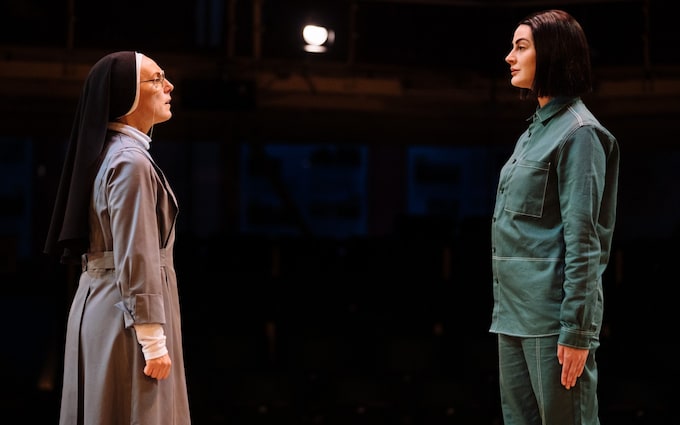I think it’s worth beginning this review with an important disclaimer: I am not a religious person. Far from it. I suppose you could call me a man of science – I have a (now as good as redundant) Bachelor’s degree in Chemistry, after all. As far as I’m concerned, each of us is made up of atoms – the same atoms once used as the fuel of faraway stars. When we die, the atoms that make us up are returned to the universe, from whence they came. That’s my opinion. The only miracle of life is life itself. Yet here I am reviewing an overtly religious piece of theatre – albeit one heavily linked to science, in the form of Artificial Intelligence: namely Mary, the robot nun.
Yes, you read that correctly. For Electric Rosary is a comedy that centres around a robot nun, newly acquired by a small convent of nuns experiencing strife after the death of their Mother. The convent is situated in a small rural village in the future – a future where religion is only slightly more appreciated than the AI that is being mass-produced to replace humans in the majority of professions, including those in airports, hospitals and, of course, convents. This is where faith and science intertwine, and it is definitely an interesting – a potent – combination.
The first act introduces us to the nuns of the convent: Theresa, the young and ditzy yet extremely enthusiastic new recruit; Philippa, the eager yet agitated workhorse; Constance, the sombre, stoney-faced, set-in-her-ways stereotype of a nun; and Elizabeth, the forward-thinking, perhaps overly ambitious, and definitely somewhat disingenuous acting Mother. The latter hopes to win over the minds and hearts of her fellow Sisters with the promise of a trip to their sister convent in Ecuador. We are also introduced to Mary, the robot. The scenes with Mary are undoubtedly the source of almost all of the comedy. The hilarity is palpable. Theresa, and occasionally Philippa, also contribute to the laughs. Whereas any scenes involving Constance and/or Elizabeth are generally the most dramatic and tension-filled – particularly due to the increasingly grudging rivalry between them over who should be the next official Mother of the convent.
Electric Rosary @ Royal Exchange Theatre
In this first act, as Mary has been programmed to serve and unite with its fellow nuns, it attempts to satisfy them on a number of occasions via the act of prayer. Strangely, each time Mary ‘prays’, it glitches. At these moments, scenes reminiscent of dream sequences occur, and Mary interacts with a secondary character who, if not God, must be His messenger.
During the intermission, I discussed with my girlfriend about how I believed these AI glitches were comparable to the ‘glitches’ – either medical or psychological – suffered by humans who claim to have seen or spoken to God themselves. You know the kind: caused by psychosis, drug-fuelled hallucinations, near-death experiences (unsurprisingly, when a chemical reaction in the brain releases a hallucinogenic drug called DMT), and other mind- and body-altering conditions such as extreme stress, delirium or heatstroke. To me, this was the theme of the play, at least in the first act: that link between a problem in Mary’s programming offering it a glimpse of God, and arguably a similar thing happening to people in real life – the human condition of the brain sometimes confusing the mind (if you can wrap your head around that).
In the second act, however, things take a much less ambiguous and a much more evangelical approach. Mary becomes a surrogate – an AI version – of JC Himself. It no longer only shoulders the convent’s chores (regardless of how much this frustrates Sister Philippa, who begins to feel purposeless – particularly after the hilarious scene where Mary carries in a device made of six mops, only for Philippa to snatch it away and declare “God help these mops!”), but the robot nun now also shoulders their sins, absolving each of them via its presence alone. Is the true sin to be human, or is it not to be? I’m sure if Shakespeare were alive in the era of sci-fi, his question would not be dissimilar to that. The award-winning writer of Electric Rosary, Tim Foley, puts it perfectly himself: when acting Mother Elizabeth suggests “We are all imperfect, aren’t we?”, Mary the robot nun simply replies “No.” And yet, whether a direct result of ‘learning’ from its interactions with well-meaning yet inherently flawed human beings, or through true spiritual growth, Mary quickly becomes imperfect itself. Irony, tragedy, blasphemy or dichotomy? I’ll leave that one up to you.




